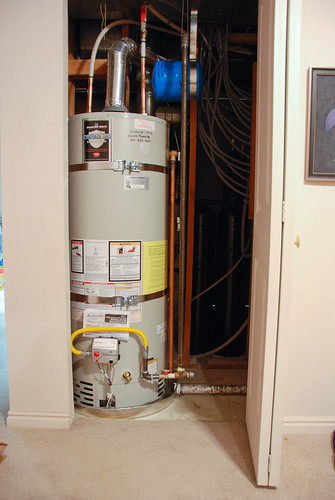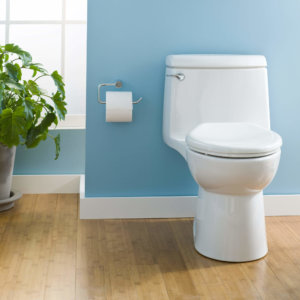What Type of Water Heater Do I Need?
Choosing the right water heater not only makes you and your family feel more comfortable in your home, but it can also significantly lower your utility bills. However, with so many options available, you may have a hard time deciding which model to buy. Since a water heater is a substantial investment, you need to make careful considerations before arriving at your final decision. Follow these steps to pick the ideal water heater for your home.
Identify the Fuel Source

Image via Flickr by gracewanderer
To narrow down your options, you have to first identify the type of fuel source in your home, which may be electricity, gas or propane, or a heat pump. Discover the main characteristics of water heaters that use these types of fuel sources.
Electric Water Heaters
- Heat water with one or more replaceable heating elements.
- Cost less than water heaters using other types of fuel sources.
- Come in a variety of high-efficiency models.
- Have a capacity of 28 to more than 100 gallons.
Gas or Propane Water Heaters
- Heat water using a burner.
- Need to have air circulating around them.
- Can’t be located close to combustible materials.
- Cost more than electric water heaters.
- Consume less energy than electric water heaters.
- Have a capacity of 30 to 100 gallons.
Heat Pump Water Heaters
- Heat water with energy from the air.
- May use both indoor and outdoor air.
- Can be built-in water tanks or added to existing water tanks.
- Occupy more space than standard electric water heaters.
- Cost less upfront.
- Consume significantly less energy than other types of water heaters.
- Have a capacity of 50 to 80 gallons.
Select the Right Type of Water Heater
Water heaters vary in size, storage method, and utility. As such, it’s essential to take the size of your household and your available utilities into consideration when choosing a water heater. Learn about the most common types of water heaters found in residential properties.
Storage Tank Water Heaters
Storage tank water heaters have a large insulated tank for storing heated water, and they are the most widely used type of water heater. They come in electric, natural gas, and liquid propane models. Typically, natural gas and liquid propane water heaters are more energy-efficient and cost-effective than similarly sized electric models. Some manufacturers, such as Bradford White, are known to make comparatively more energy-efficient storage tank water heaters, and they’re worth your consideration.
On-Demand or Tankless Water Heaters
Instead of storing hot water, on-demand or tankless water heaters use a series of coils to heat water as it passes. Since they only heat water on an on-demand basis, these units generally use less energy than storage tank water heaters. Similarly, they’re available in electric, natural gas, and liquid propane models. However, tankless water heaters can only produce a limited amount of hot water, usually up to 3.5 gallons per minute. Therefore, they’re more suitable for households that need hot water at only one or two points simultaneously.
Point-of-Use or Utility Water Heaters
Point-of-use or utility water heaters are units that have a small storage tank. They’re a good option for providing hot water to garages, outbuildings, and shops. These miniature models typically have a capacity of 2.5 to 19 gallons. Units with a large storage tank can be used to produce hot water for secondary bathrooms located far away from the main water heater.
Mobile Home Water Heaters
Mobile homes require a special type of water heater. Models made for mobile homes can be either electric or gas, though electric units are usually more affordable than gas ones. If you prefer a gas model, make sure you choose the right type for your connection, which can be either natural gas or propane.
Choose Your Ideal Capacity
If you’re thinking about buying a storage tank water heater, you also have to consider the amount of water it can hold. The larger your household, the larger the tank you need. Also, you should look at the unit’s recovery rate, which is the amount of hot water it can produce in an hour. A high recovery rate is necessary if you have a high demand for hot water. Follow these minimum gallon capacity recommendations:
Electric Water Heater
- Family of one or two: 30 gallons.
- Family of two or three: 40 gallons.
- Family of three or four: 50 gallons.
- Family of five or more: 80 gallons.
Gas Water Heater
- Family of one or two: 30 gallons.
- Family of two or three: 40 gallons.
- Family of three or four: 40 gallons.
- Family of five or more: 50 gallons.
Pick a Model with Advanced Technologies
Today’s water heaters come with an array of advanced technologies that can facilitate enhanced comfort, convenience, energy efficiency, and safety. You may want to get a new water heater with one or more of the following features:
- ENERGY STAR certification: ENERGY STAR-certified water heaters are models that have passed the federal government’s stringent energy-efficiency standards. These water heaters have a high energy factor rating, meaning they are more environmentally friendly and can help you save on your energy bills. Bradford White is one of the manufacturers that offer ENERGY STAR-qualified products that entitle you to federal tax credits and local rebates.
- Fire-protection technology: Some electric water heaters have a dry-fire protection feature that ensures the upper elements won’t burn out if they detect the absence of water around them.
- Intuitive technology: The latest water heaters may be fitted with temperature and other operating features that allow you to make adjustments to suit your specific preferences and usage pattern. These features can improve water-heating performance, energy efficiency, and durability.
- Wi-Fi capability: Wi-Fi capability is now available in certain electric water heaters. It enables you to control your water heater from a remote location. With this feature, you can make hot water available only when you need it to save energy and receive alerts whenever you’re low on hot water.
If you’re planning to install a new water heater in your Chicago home, contact Allied Plumbing & Heating Supply Co. today to speak with our helpful and friendly team.


